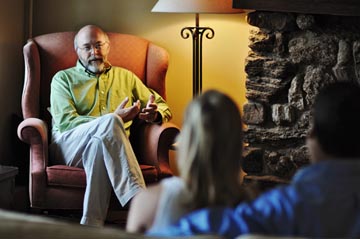A crowd of concerned parents and community members from this New York City area town convened recently to discuss the alarming rate at which their teenagers were becoming addicted to drugs. Forty-fourÂ

percent of tenth graders and 55 percent of twelfth graders participate in binge drinking, reported Seth Weitzman, a principal in the Mamaroneck School District. Quoting from a recent teen survey conducted by Larchmont-Mamaroneck RADAR, a community coalition group formed to reduce substance abuse in their Communities; Weitzman spoke with alarm to community leaders as well as parents and citizens about the statistics, which he said were more than twice the national average among high school students.
In Oak Park, CA, a suburb just north of Los Angeles, John George of the Bureau of Narcotic Enforcement for the California Department of Justice, reported that approximately 14,000 students from 115 public schools, both junior highs and high school, polled for a 2007-2008 study had tried drugs. Speaking recently to concerned parents and faculty at Oak Park High School, George warned that, beyond the direct impact that substance abuse poses to the health of students themselves, it was also found at the root of serious car accidents involving students. Nineteen percent of California youths involved in auto crashes had been using marijuana, George reported , noting that today’s “joint†is far stronger than its predecessors in the 1960s and 1970s.
Complicating the problem, he noted, is the increasingly large number of homes where both parents much work and, as a result, are not as available to their teens when they need emotional support, encouragement, counsel or just a listening ear. Plagued with depression, anxiety and a plethora of other social stresses, teens were increasingly turning to drugs and alcohol to numb the pain that coming of age in today’s economically and socially ravaged society involves.
Parents care. That’s not the problem. They want to be there for their kids. But sometimes being there and caring aren’t enough. Involvement of concerned and compassionate drug rehab professionals in a safe environment is the key.
One drug treatment center in Malibu, CA, providing just such Drug Rehab counseling in a private, family-style setting is Sunset Malibu. Featuring both conventional and holistic treatments, the drug rehab center focuses on providing lasting freedom from substance abuse, tailored to the needs of the individual and coupled with life skill training.
Drug rehabilitation for teenagers, of necessity, requires a different approach than it does for adults, Sunset Malibu staff maintains. Because youth are in their formative stages, they explain, the damage they can do may often be long-term, affecting not only their health but every other aspect of their lives from relationships to employment to their overall ability to experience a productive, satisfying life.
For this reason, the professionals at Sunset Malibu say, residential drug rehab centers are to be preferred over outpatient programs. At residential facilities, teens have 24/7 access to caring, trained professionals who can respond to their special needs as maturing individuals. Due to their stage of development, teens need input from others even more critically than adults, drug rehab center staff said, because their lack of life experience makes them less able than adults to handle the various challenges they meet on a day-to-day basis.
At Sunset Malibu, teens receive the specialized kind of support they need to become free from substance abuse. The drug detox program is safe, gentle, and involves both traditional and holistic methods. Teens are given constant supervision and support during the entire detoxification process, allowing the drug detox experience to be weathered with greater strength.
After Drug Detox, residents learn important life skills that will help them make positive choices that will lead them on the path to productive, satisfying lives. For more information, visit www.drugrehabsunsetmalibu.com.
About Sunset Malibu: Sunset Malibu is one of California’s top residential care facilities for adolescents and adults seeking freedom from addictive behaviors, including substance abuse, pain killer addictions and eating disorders.
Via EPR Network
More Healthcare press releases
 Drug rehabs are always hard. Those patients who complete their drug rehab programs successfully are the ones who get the best support along the way, from caregivers who know exactly what they’re doing and care deeply about the work. The right drug rehabs administered by the right drug rehab experts will quite literally change your life. You owe it to yourself, and to the people who care about you, to learn that truth on your own terms.
Drug rehabs are always hard. Those patients who complete their drug rehab programs successfully are the ones who get the best support along the way, from caregivers who know exactly what they’re doing and care deeply about the work. The right drug rehabs administered by the right drug rehab experts will quite literally change your life. You owe it to yourself, and to the people who care about you, to learn that truth on your own terms.









